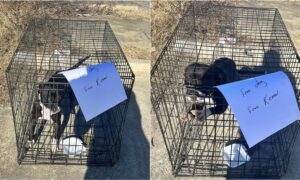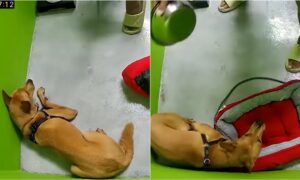“This post contains affiliate links, and I will be compensated if you make a purchase after clicking on my links.”
Some of us can usually tell how our dog is feeling just because we know them so well. But, did you know that, like humans that frown to indicate sadness or tense their jaw when angry, dogs show us what they’re feeling with facial movements too. Below, dog trainer Jolanta Benal from QuickandDirtyTips.com explains how to read your dog’s facial expressions.
How To Read Your Dog’s Facial Expressions
Gaze into your dog’s eyes. Actually, hold off a second. Among canines, maintaining direct eye contact often signals challenge and confrontation. Hang around a dog park long enough to see a scuffle or two break out. You may catch one or both of the dogs involved giving each other a hard, wide-eyed, unblinking stare just before the quarrel erupts. Or one dog may blink and avert his gaze. That signal often defuses tensions. Then both dogs may shake their bodies as if shaking off water. Scuffle averted, may peace prevail.
How to Read a Dog’s Eyes
Say you find yourself face to face with a dog whose body language expresses challenge–his tail is high and curled tightly over his back, and he’s oriented head-on to you. He watches you with his pupils dilated, and he’s not blinking. That unblinking gaze signifies one tense dog. Direct eye contact from you may well light his fuse. How to retreat safely depends on too many factors to go into here, but in general, backing away, with your gaze averted, is a good tactic.
Eye Contact May Spook a Dog
Direct eye contact gets a reaction from many a skittish or timid dog, too. One classic scenario is that the dog approaches you to sniff. Her body weight is back over her haunches, not evenly distributed or toward her front legs, and she stretches her neck in your direction. You look down, your eyes meet hers, and all of a sudden she’s backing up, barking fiercely.
You can best help a shy dog grow comfortable with you by pretending she’s not there at all. This is very unprimate–nice humans like to encourage shy people by inviting them to talk and drawing them in. Alas, our human courtesy often misfires with dogs.
What Does It Mean When Your Dog Squints or Shows the Whites of His Eyes?
Squinting, the way you might squint when you smile, generally reflects relaxation or happy excitement. Watch the whites of a dog’s eyes for clues to a very different frame of mind. Sometimes, the whites are visible just incidentally–for instance, a resting dog may be disinclined to move his head to look at whatever’s caught his interest. More often, though, a dog showing the whites of his eyes is anxious and may even be about to snap.
Trainers call this look “whale eye.” The whole package includes tense facial muscles; the dog’s mouth may be tightly closed, or you may see teeth, with a curled lip or a snarl.
Commonly, whale eye marks a dog who’s been backed into a corner or who’s guarding a food bowl or a prize chew. Approach only if a dog bite is on your shortlist of experiences you’d like to have that day. If you need to move the dog immediately, try inviting him to go for a walk. Once he’s gone from the spot, his prize should be cleared away. And your next call, of course, is to a good behavior specialist.
How to Read a Dog’s Mouth
I’ve mentioned a tightly closed mouth as a sign of doggy tension. If your dog naturally carries her mouth closed, but the muscles of her lips and muzzle are soft, you needn’t be concerned. And not all tension is bad from the dog’s point of view, of course. You may notice your smiley dog’s jaws close up when she draws a bead on a squirrel, for example. In that particular heightened state, your dog probably feels pretty good. The squirrel’s opinion may differ.
How you respond to the sight of your dog’s mouth going from open to shut should depend on what elicited the change. If your dog is just watching something with close interest, no biggie. But suppose, for example, your dog lunges at other dogs on leash. When his jaw shuts tensely, he’s near the limit of his self-control, too close to a dog he finds provocative. Next, the corners of his lips will move forward, and then watch out! Thar he blows. Increase distance from the other dog at the first sign of tension on your dog’s face, and save both of you a lot of stress.
How to Read a Dog’s Lips
By the way, it’s always worth watching the corners of dogs’ lips–the commissures. These are such revealing body parts, and few people know how to read them. A tense dog whose commissures push forward is heading for the offensive. If you see commissures pushed back, think fear. Aggression isn’t necessarily imminent, either way, but be aware of what emotional tone you’re dealing with.
Finally, a tensely closed mouth may indicate physical discomfort. I know my old, arthritic lady dog is having an especially good day when she doesn’t hold her mouth shut but instead lets it open softly on our walks.
Refusing Food Indicates Tension
Many a client believes her dog isn’t food motivated because he won’t eat outdoors. Indeed, there are dogs for whom other motivators often trump food, and don’t be surprised if your well-fed dog is more interested in chasing rabbits than in that same-old, same-old kibble in your hand. Often, though, it’s a worried dog who won’t eat outdoors, or who swallows treats mechanically without seeming to notice them as they go down.
What Do a Dog’s Lip Licking and Drooling Mean?
Lip licks are distinct from a dog’s satisfied licking of her chops after she eats something tasty. A quick in-and-out flick of a dog’s tongue over her lips is generally an appeasement signal. Watch a dog being walked on a choke collar or being trained by the old-school leash-pop method. You’ll probably see the dog lick her lips every time the collar tightens abruptly or the trainer jerks on the leash. Appeasement isn’t a bad thing in every context, and some dogs offer it much more readily than others. But appeasement gestures delivered over and over and over again, in any context, tell you that something in the situation is producing an unhappy dog.
Last but not least, watch for profuse drool not elicited by a nearby barbecue. Constant profuse drool suggests that your dog is a Mastiff or maybe that he needs to see a vet. But acute drooling that isn’t typical for your dog may indicate significant fear. When you interpret this or any of the other signals I’ve discussed, remember to look at the whole dog, not only at one part.
Happy Dog Face
And the happy dog face? Think relaxed, smiley, squinty, blinky. In sleepy contentment, your dog’s facial muscles will be soft and quiet, never tense and stiff. In happy excitement, her face may be full of movement. Does somebody want to play? Have her ears mooshed? Or just say hi? Who’s got a big old face right on the end of her head?
Until our dogs learn to speak “human” or how to write it down for us, we’ll have to rely on their natural, instinctive expressions to tell us what they’re thinking.
So, do you know how to read your dog’s facial expressions? Tell us your comments below!













Edwin
Sep 25, 2014 at 8:56 am
This piece of writing presents clear idea in support of the new
visitors of blogging, that really how to do blogging and site-building.
blackplanet.com/your_page/blog/view_posting.html?pid=2014175&profile_id=64871548&profile_name=classypoet9295&user_id=64871548&username=classypoet9295
Sep 13, 2014 at 10:33 pm
What’s up to every , for the reason that I am really keen of reading this webpage’s
post to be updated regularly. It includes fastidious information.
Angelica
Sep 12, 2014 at 5:37 pm
Because the admin of this site is working, no hesitation very rapidly it will be renowned, due to its
feature contents.
Rebbeca
Sep 10, 2014 at 5:57 am
I think this is one of the most significant information for me.
And i am glad reading your article. But want to remark on few general
things, The site style is perfect, the articles is
really nice : D. Good job, cheers
litter robot
Apr 1, 2014 at 1:18 pm
When it comes to buying a cat bed, look into the size of the bed, the size of your cat, and the
material that you want the bed to be made of. Sometimes they climb
a tree to get away from a chasing dog, or other thing they perceive to be a danger.
Scratching is a natural behaviour for cats, although you’ve probably figured this out
by now given the state of your furniture and curtains.
you could try this out
Mar 11, 2014 at 4:19 am
2 Knowledge of video marketing quotations Video
Foundation Topics listed in the Implementing Cisco Video Network Device, Part 1 VIVND1 v1.
Google changed the face of it, and then drive all the
way back. Videos are purposely generated in order to
get sales. Is there anything that can be applied to real world situations.
Hewlett-Packard makes a quality machine that can be purchased today.
4K/2K RAW recording option3. But, isn’t it more exciting if we will not just settle in imagining scenarios in the paper pages?